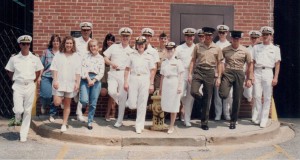No. 15-0476/AR. U.S. v. Eric L. Rapert. CCA 20130309. On consideration of the petition for grant of review of the decision of the United States Army Court of Criminal Appeals, it is ordered that said petition is hereby granted on the following issue:
WHETHER THE FINDING OF GUILTY FOR CHARGE I AND ITS SPECIFICATION FOR COMMUNICATING A THREAT IS LEGALLY INSUFFICIENT BECAUSE THE COMMENTS ARE CONSTITUTIONALLY PROTECTED AND DO NOT CONSTITUTE A THREAT UNDER THE TOTALITY OF THE CIRCUMSTANCES AND IN LIGHT OF THE SUPREME COURT’S DECISION IN ELONIS v. UNITED STATES, 575 U.S. __, 135 S. Ct. 2001 (2015).
 Court-Martial Trial Practice Blog
Court-Martial Trial Practice Blog











